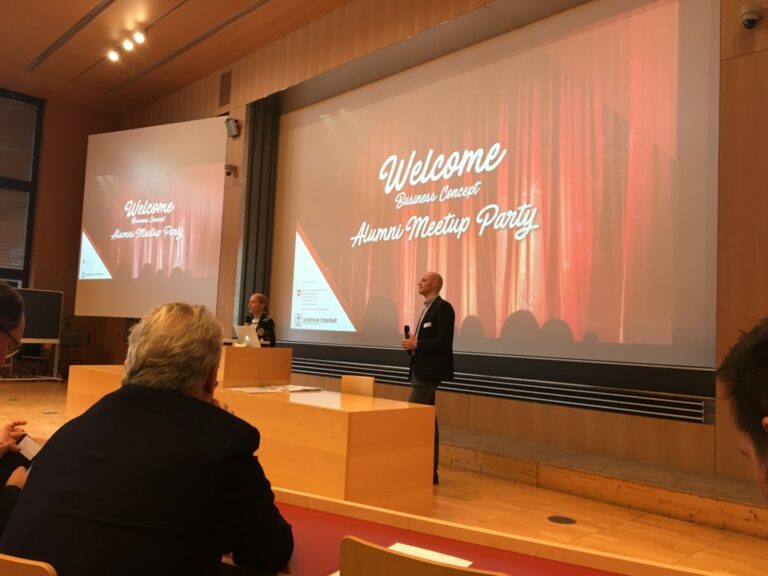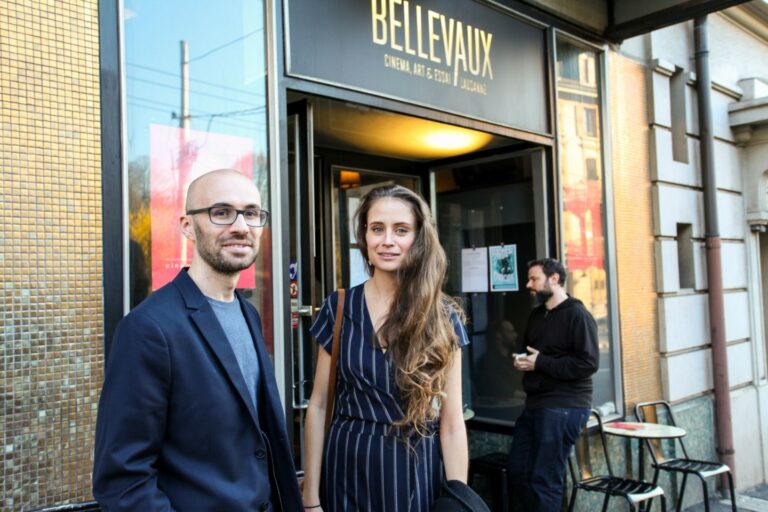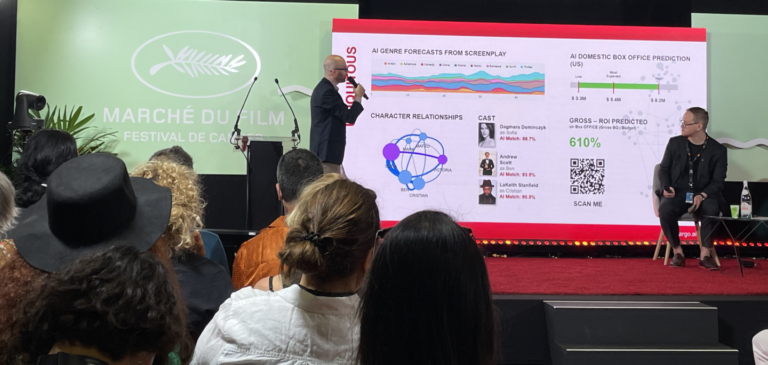The fourth edition of the Ouchy Film Awards saw a new milestone for the global film industry. For the first time ever, a festival presented an award for the best screenplay based entirely on the insights provided by artificial intelligence.
This award, which relied on artificial intelligence analysis of 5 nominated screenplays, was created to see if AI systems can reduce the bias inherent in the traditional human jury selection process. Such an advancement could have numerous ramifications for the industry and so would represent a huge leap forward in terms of fairness if it were proved possible.
A total of four awards were given on the night. Of the two screenplay awards, the first, ‘Best Screenplay Award’ used the ‘traditional’ adjudication approach where the jury read the five screenplays and then decided on their favorite.
The second award, named the ‘AI Award for Best Screenplay’ was a world’s first. Breaking with tradition, this award asked the jury to base their decision solely on the results of an AI analysis of the five screenplays. The screenplays chosen were identical to those nominated for the best screenplay award mentioned above.
The ultimate goal of this experiment was to determine whether artificial intelligence systems can help festival juries make their selections in a fairer and more unbiased way.
Let’s take a look to see what happened.
The Results
The 2021 Ouchy Film Awards received over 300 submissions, a positive sign that interest in the festival continues to evolve despite the Covid-19 epidemic. For each of the four awards, a total of five screenplays were selected for the final competition.
The 2021 Jury:
- Alexandre Wadouh
- Pamela Rosenberg
- Eduardo Escudero
- Larry Cech
- Martine Melloul
- Krzystof Terej
Ouchy 2021 Awards:
Best Feature Film
- Jelgava’94, Dir: Janis Abele, Latvia
- The Last To Leave Are The Cranes, Dir: Emilie Girardin, Germany
- Final Round, Dir: Mohamed Fekrane & Gustavo Cortés Bueno, Morocco
- Primavera, Dir: Carlos Porto de Andrade Júnior, Brazil
- In the Shadows, Dir: Erdem Tepegöz, Turkey
Watch Nominees: https://www.youtube.com/watch?v=PvFf2_U3cMk
Winner: Final Round, Dir: Mohamed Fekrane & Gustavo Cortés Bueno, Morocco
Best Short Film
- Lonely Hearts, Dir: Dennis Cahlo, United States
- ZenMan In Love, Dir: Klaas Diersmann, United Kingdom
- Kite, Dir: HongWei Wang, China
- One to One, Dir: Carol-Anne Grosbois-Claveau &Sarah Vaillant, France
- Summer Time, Dir: Andra Tévy, France
Watch Nominees: https://www.youtube.com/watch?v=Wm9PJkeLMQ4
Winner: Kite, Dir: HongWei Wang, China
Best Screenplay (Traditional Selection)
- Immolation, by Patrick R Young, United States
- Impact, by Mel L. Nieves, United States
- In The Ring With Giants, by Paul Gordon, United States
- Clown and Out, by Sean Ponzini, United Kingdom
- The Poster Girl Stewardess, by Peter Gartner, United Kingdom
Watch Nominees: https://www.youtube.com/watch?v=bGPwVDFJZMk
In order to highlight the traditional approach regarding how jurors decide on which nominee to give the award to, juror Martine Melloul was asked how she came to her decision regarding her favorite script.
She stated that “You are attracted to the story, the characters, is it well contracted, the pacing… there are a lot of elements. I think the first impression is that you either liked it or disliked it, then you sit down, and you analyze why you liked it or didn’t like it.”
For the winner of the best screenplay award, the jurors chose:
Winner:
Impact
AI Award for Screenplay
- Immolation, by Patrick R Young, United States
- Impact, by Mel L. Nieves, United States
- In The Ring With Giants, by Paul Gordon, United States
- Clown and Out, by Sean Ponzini, United Kingdom
- The Poster Girl Stewardess, by Peter Gartner, United Kingdom
Largo.ai CEO Sami Arpa was asked to explain the background of this new award and how the winner was selected, he stated that the purpose of this experimental award was to “present the AI results (of the five screenplays) to the jury to see how it would affect things.”
The results were presented in the form of graphs and additional data such as ‘similar films analysis’, without telling the jury which film analysis was which. The jury was then asked to select what they interpreted the best screenplay of the five was based on the data alone.
The jury gave two films an identical score so the award was given to both screenplays. The winners were:
Best Screenplay winners according to Largo.ai
Impact, by Mel L. Nieves, United States
In The Ring With Giants, by Paul Gordon, United States
Can AI Reduce Bias?
The results of the two screenplay awards are very interesting. Rather than highlighting any discernible level of bias in human juries, they seem to indicate that, for this jury at least, that the human-based selection process is very fair.
Since the historical data pool used to teach Largo.ai is multi-source and extremely large, the system represents the opinions and tastes of a wide section of moviegoers, both past and present.
This means that, in essence, while a human juror might have a good perspective and feeling over what works and what doesn’t, AI has the hard data to be sure of what actually does and what does not. Indeed, rather than being regarded as one entity or opinion, AI should actually be viewed as the opinion of a vast audience.
It is for this reason that it has immense power to provide filmmakers with the insights they need to understand how their films will impact audiences.
In terms of reducing bias in the jury process, AI does indeed have the power to ensure the selection process is fairer. As a tool that offers a unique perspective, it can be used by jurors to evaluate their own feelings to ensure that they are right. Additionally, AI results can also be presented to audiences to validate the selections and to allow jurors to compare their own opinions to that of AI.
It seems certain that AI will be increasingly adopted to increase audience engagement in awards ceremonies for this reason while also being used as a tool to ensure that unfair jury bias is kept to a minimum.
A Little About Largo.ai
Largo.ai is an AI-assisted filmmaking company that is based in Switzerland. Its AI system, Largo.ai is a data-driven machine learning program that provides insights into the movie industry via the company’s SaaS platform.
The company aims to democratize the filmmaking process by allowing filmmakers and producers access to industry data-derived insights that bring movie professionals closer than ever to their audiences. Largo.ai can provide insights at all phases of a film’s lifecycle, from script development and casting through to financing, post-production, to marketing and distribution.
Ouchy Film Awards
The film festival takes its name from the famous port in Switzerland.
Now in its 4th year, the event has attracted over 3000 submissions throughout its history. The 2021 event was its first online festival due to the ongoing pandemic. Normally, the event is held each year at a range of venues in Switzerland. Watch the panels from Ouchy Film Awards below:
The fourth edition of the Ouchy Film Awards saw a new milestone for the global film industry. For the first time ever, a festival presented an award for the best screenplay based entirely on the insights provided by artificial intelligence.




